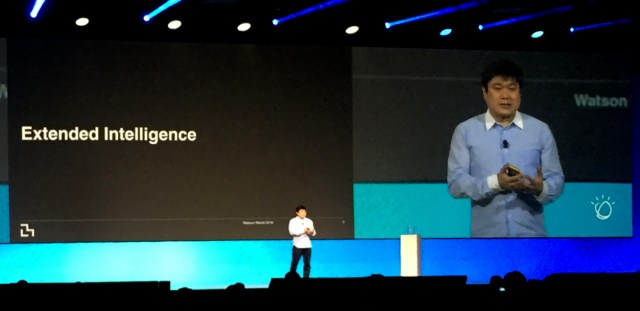Right before Halloween, from October 24th to October 27th, I went to WoW. Of course, when I told that to my kids they assumed I was going to play World of Warcraft in Las Vegas for a week – but it actually stands for World of Watson, the IBM conference. But who knows… What happens in Las Vegas stays in Las Vegas.
This article is one of a 3-part summary. All articles are independent and do not require to be read in a specific order. On my blog (here), I cover the event in a more personal style. If you love Big Data, data lakes, governance, and data wrangling, crunchy details are on the Zaloni blog. If your interest is more on Informix and “Small Data” (gosh, I hate this term), jump to the IIUG website.
All I Care About is the Cognitive World
“Cognitive” was the big word of the World of Watson conference. It was worth a look in the dictionary. Merriam-Webster’s dictionary defines cognitive by:
1: of, relating to, or involving conscious mental activities (such as thinking, understanding, learning, and remembering)
2: of, relating to, being, or involving conscious intellectual activity (as thinking, reasoning, or remembering) <cognitive impairment>
3: based on or capable of being reduced to empirical factual knowledge
And this is what computers are doing more and more: learning (they remembered already), . With the easy (easier) access to vast amount of data, it is easier for computers to remember. Have you ever met someone with an impressive memory but not very smart? It happens, but when you meet someone sharp, my experience is that his memory is vast – this is absolutely not scientific and if you agree or disagree the comments are here for that.
So, when I look back at Prolog or LISP (2 typical Artificial Intelligence languages used in college and nowhere else), to achieve anything, you needed to build some sort of inference engine. This was a painful process. Fast forward 25 years (or so) and thanks to easier access to data and computational power, AI can come to life. However, the acronym has evolved from Artificial Intelligence to Augmented Intelligence or Extended Intelligence.

Meet Joichi “Joi” Ito. Joi runs the MIT Media Lab.

One of the subject Joi covered in his address is known as the as the Trolley Problem – he covered more topics, which you can read on Zaloni’s blog and the IIUG’s website.
The trolley problem is this ethical dilemma that can be applied to those autonomous cars, in situations where they need to make life-decisions.
If the car loses control, should the car try avoiding a group of 5 pedestrians? Saving the driver? Killing the passenger? Where do you stand morally on this issue? Take the MIT moral test.

It was a good moment to remind the audience about Isaac Asimov’s Laws of Robotics. They seem more current than they were when I spent my SAT prep (bacalauréat) reading all Asimov wrote in Sci-Fi.
Joi reminded us of law 0, a lesser known one, which makes that the Three Laws of Robotics are actually 4:
- (0) A robot may not harm humanity.
- (1) A robot may not injure a human being.
- (2) A robot must obey the orders given it by human beings.
- (3) A robot must protect its own existence.
The 0th law is more philosophical than the 3 original ones, and raises moe ethical questions, like what would a robot have done based on the yesterday’s results of the presidential election?
Let’s Talk Data
WoW is not only about science fiction that becomes reality. We also talk about data. Not too long ago, people working with data were DBA (Data Base Administrator). This was surely one of the most boring jobs in the world, especially for Informix DBAs. Check out the video if you are in doubt.

On a more serious note, Rob Thomas explain the four key roles in the data business: Data Engineers, Data Scientists, Business Analysts, and Application Developers. We are far from the know-it-all professional of the 80s who would design the database and application for a vertical market.
The key message to remember from Thomas is that IBM is heavily investing in the Apache Spark platform. IBM’s vision is to build an Analytics Operating System and Spark is the foundation of it.

Cloud

IBM believes in Cloud. Nothing really surprising here. I strongly believed in Cloud even before it was called Cloud. And really, as Tom Friedman, a random three-time Pulitzer Prize winner (and WoW keynote speaker), “This ain’t no cloud, folks. This is a technological supernova, the explosion of a star. And we know what happens with the explosion of a star — it’s the center of everything”.
I can only think of another famous (and controverted) quote from another Thomas: “I think there is a world market for maybe five computers,” by Thomas J. Watson Sr. in 1943. Isn’t the cloud just a big computer? At some point, will we need more than 5?
Good Catches in Vegas

Every time I go to Vegas, we try to find a new restaurant or hole in the wall. I rarely share them as it is not the purpose of this blog (and with the limited time I have, I’d rather focus on the key message). However, this time is an exception as we went to the Pioneer Saloon in rural Nevada, almost in California. Well worth the little detour off the Strip.


Do you Want More?
For more coverage of World of Watson, don’t forget to read my other articles on the Zaloni blog and on the IIUG website.

Comments are closed.